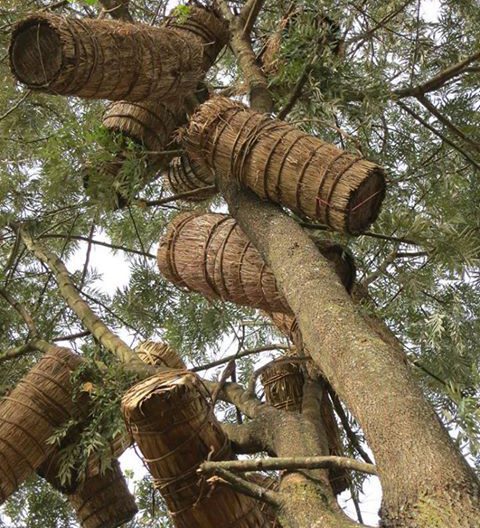
It is general assumed that empowering women economically will contribute a great deal in rapidly lifting a household out of poverty thereby extricating the entire society out of poverty. For this end it is important to intensify interventions in all sectors to raise the role of women and their benefits.
One of the sectors that women have benefitted very low is beekeeping. It is assumed that more than two million farm households have been involved in beekeeping production in Ethiopia and it is also estimated that around 12 million bee colonies have existed in the nation, according to Livestock Research for Rural Development (LRRD). This makes Ethiopia the largest bee producers in Africa and the fourth producer of beeswax in the world.
It produced 43,000 tonnes of honey and 3,000 tonnes of beeswax but the country has the potential to produce 500,000 tons of honey and 50,000 tonnes of beeswax, LRRD’s study indicates. The quality of Ethiopian honey is generally poor as 95 per cent of beekeepers follow the traditional method of beekeeping practices and; 85 per cent of the produced honey is sold to local brewers of “tej”, a honey wine. Given all these problems, beekeeping covers only 1.3 per cent of the agricultural GDP of Ethiopia.
Yet the involvement of women in the beekeeping industry is very low. First of all the practice of beekeeping has remained constrained by a dependence on traditional harvesting techniques that are inefficient and unprofitable. Moreover, it has remained largely a male-dominated activity, according to an article published by YESH program which is engaged in promoting participation of Ethiopian Women in beekeeping.
“Hives are traditionally hung on tall trees far away from the home and honey is harvested after dark since it is believed to minimize the aggressiveness of bees. These practices have historically made beekeeping and honey production inaccessible for many women and girls as it is considered unsafe and inappropriate for them to travel long distances at night” YESH indicated.
The program took this into consideration in their planning and became the first of its kind to engage large numbers of young women and girls in beekeeping value chains in Ethiopia. YESH plans to reach 10,000 young people over five years, with at least 30 percent being young women. During its first two years in operation, YESH recruited 2,900 young people to its apiculture sites of northwestern Ethiopia.
As part of the program, Wudie Ayenew, who is a beneficiary of YESH program attended practical training sessions in entrepreneurship skills development and beekeeping best practices. Upon completion, she and 10 other participants in the village started a youth beekeepers’ enterprise. Using the starter kit they received from the project, she and her friends harvested two seasons worth of honey. Through their group enterprise they are also saving a portion of their earnings to meet future expenses and secure a bank loan.
“We are living in a village that produces high-quality eco-honey, but I have never seen females engaging in the business,” Wudie describes. “Since childhood, we were guided to believe that females are not allowed to touch beehives. YESH project has become our economic liberator.”
Wudie was also selected for a customized female-only training-of-trainers workshop organized by the YESH project. While the technical content of the training is the same as what is provided to young men, this specialized workshop is designed to address some of the social and cultural barriers that the young women are more comfortable and candid discussing amongst themselves. Wudie has not only improved her technical competencies but has also built her confidence to return to her community and continue training and inspiring other young female beekeepers.
“It has opened our eyes and supported us to directly engage in improved beekeeping practices and challenged the widely held perceptions in our communities that discourage us from practicing beekeeping,” Wudie says of the effects of the YESH project. It brought about attitudinal changes in our villages and helped us build assets through beekeeping practices and improve our livelihoods.”
Wudie and young female participants like her have become trail-blazers in their communities and are transforming traditional beekeeping into an important source of income for young women. Through the promotion of improved beekeeping practices, YESH activities encourage the participation of young women in apiculture value chains and challenge attitudes and practices that perpetuate gender inequalities in these economic activities.
The communities in which YESH operates are seeing the results of young women like Wudie and recognizing the equally important role that they can play in commercial beekeeping activities for themselves and the community as a whole. Similarly the findings of the study conducted by LRRD also indicates that women beekeepers had been moderately empowered since after the New Business Model in Honey Value Chain Development project implemented in the study districts.
The major empowerments that women gained due to the intervention of the project were personal empowerment (the moderate enhancement of self-esteem, autonomy and individual capabilities) and relational empowerment (contribution to the household income, the increment of group and leadership participation and positive social norms towards women’s economic roles).
Although significant numbers of women beekeepers were benefited from the project, there is still gender gaps in the beekeeping production systems and the overall status between men and women. There were also some activities, like adult education and queen rearing, which are left without realizing the intended objective of the project.
This indicates that the government bodies should have to take over and then continued the New Business Model in Honey Value Chain Development project’s activities to ensure the full empowerment of women beekeepers at the study districts. The experiences and studies of the two programs indicate that involving women in apiculture is an untouched sector that needs due attention so as to quickly extricate women out of the existing abject economic situation.
COMPILED BY HAFTU GEBREZGABIHER
The Ethiopian Herald June 9/2021




